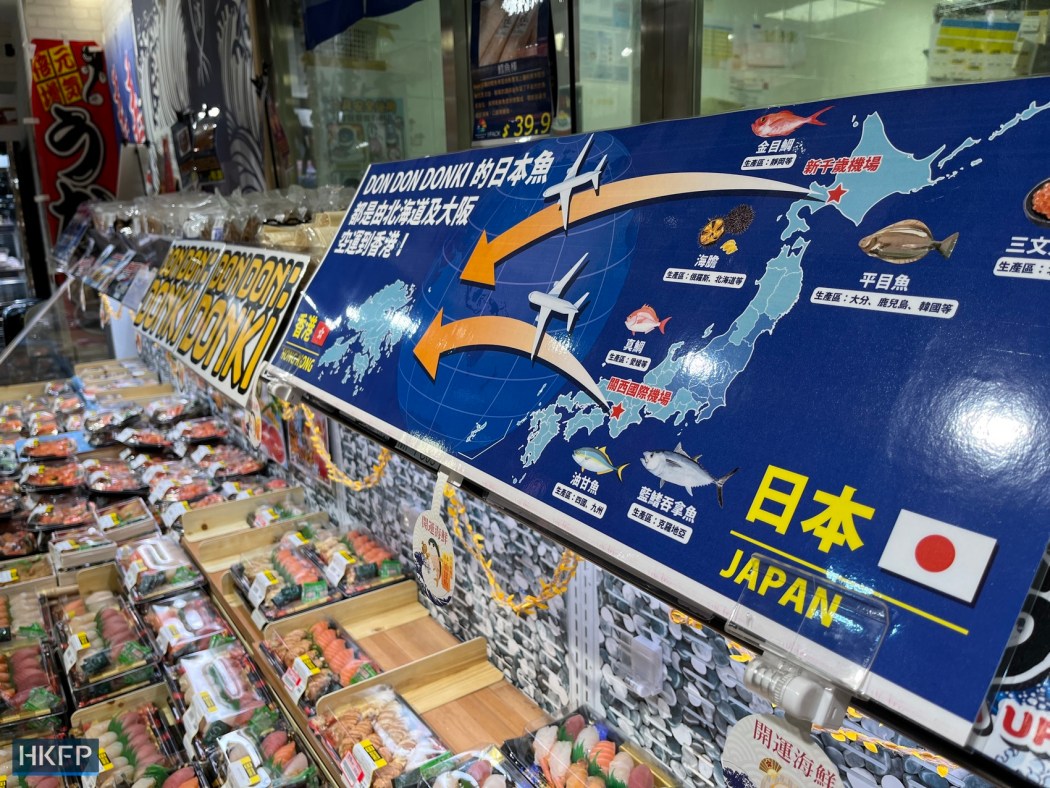Food importers have reportedly faced significant delays resulting in spoiled food, as shipments from Japan undergo prolonged visual inspections at Hong Kong International Airport.
The city’s food safety body has denied any connection between the delays and the inspections, instead citing increased imports and incomplete documentation.

The row came less than a month after Hong Kong banned seafood imports from 10 Japanese prefectures when the defunct Fukushima nuclear plant began discharging treated wastewater. Local government inspections for radiation have found no food safety issues, whilst international experts say the wastewater is safe.
Local tabloid Oriental Daily reported on Saturday that some shipments were being held for 24 hours, by which time the seafood had already gone bad. Importers who were at the airport said the delay was caused by visual inspections required for Japanese seafood imports.
HKFP has reached out to the Centre for Food Safety (CFS) for comment.
Shipments delayed
Claire Viaggi, director of food supplier Food Origin, said it took her three hours to pick up her shipments, and that more than 20 other drivers were at the airport on Saturday waiting to have their shipments processed.
“3 hours waiting for [Food and Environmental Hygiene Department] clearance because of shipments from Japan which have to be checked visually by inspectors,” Viaggi said in a post on social media site X, formerly known as Twitter. Drivers at the airport reportedly said it usually took them 45 minutes to an hour to process shipments.
Viaggi, who said she was not importing from Japan, said the new regulations caused processing delays for imports from across the globe. [FEHD] personnel were eventually able to implement a ticket system with separate queues according the origin of the shipment, she said, but not before some food turned bad.

An importer at the scene reportedly waited for up to 24 hours, which caused shipments of crab, fish, scallops, and sea urchin to spoil, resulting in losses of around HK$1 million.
Incomplete documents
The CFS told local media that there were 60 per cent more food imports than usual that day, and that documentation for some imports was incomplete, resulting in a longer wait. The spokesperson added that it took 3.5 hours, on average, to process food imports that day.

In July, Hong Kong authorities began ramping up radiation inspections of seafood imports from Japan and – following the ban in August – the CFS began releasing radiation test results. According to the latest figures on Friday, 3,408 Japanese food samples – over half of which were aquatic products, seaweed, and sea salt – were all satisfactory.
Experts say Japan’s release of treated wastewater from the nuclear power plant does not pose health risks. Early last month, the International Atomic Energy Agency (IAEA) granted Tokyo approval to release the treated water stored at the disabled power station. But Beijing and Hong Kong have expressed “strong opposition” to the discharge.
The centre also denied that the longer wait had anything to do with radiation inspection procedures, instead citing documentation, the amount of imports, and whether multiple shipments arrived at the same time as reasons for extended wait times.
The spokesperson also said that the centre deployed seven staffers to provide on-site support, adding that it would keep in contact with the industry and suggested that importers make use of refrigeration facilities at the airport’s cargo terminals if necessary.
It will also hold an online briefing this Wednesday to go through the import procedures.
Support HKFP | Policies & Ethics | Error/typo? | Contact Us | Newsletter | Transparency & Annual Report | Apps
Help safeguard press freedom & keep HKFP free for all readers by supporting our team

LATEST FROM HKFP
HKFP has an impartial stance, transparent funding, and balanced coverage guided by an Ethics Code and Corrections Policy.
Support press freedom & help us surpass 1,000 monthly Patrons: 100% independent, governed by an ethics code & not-for-profit.











